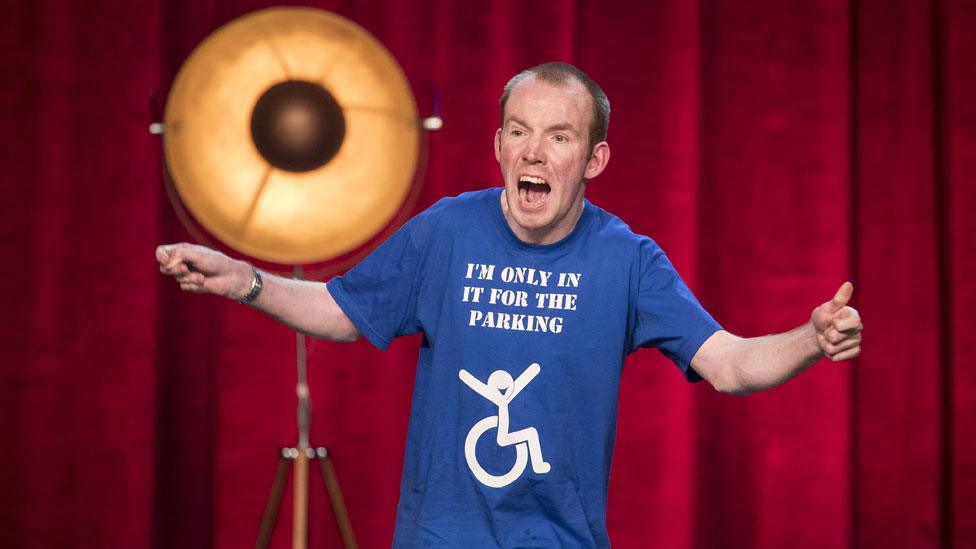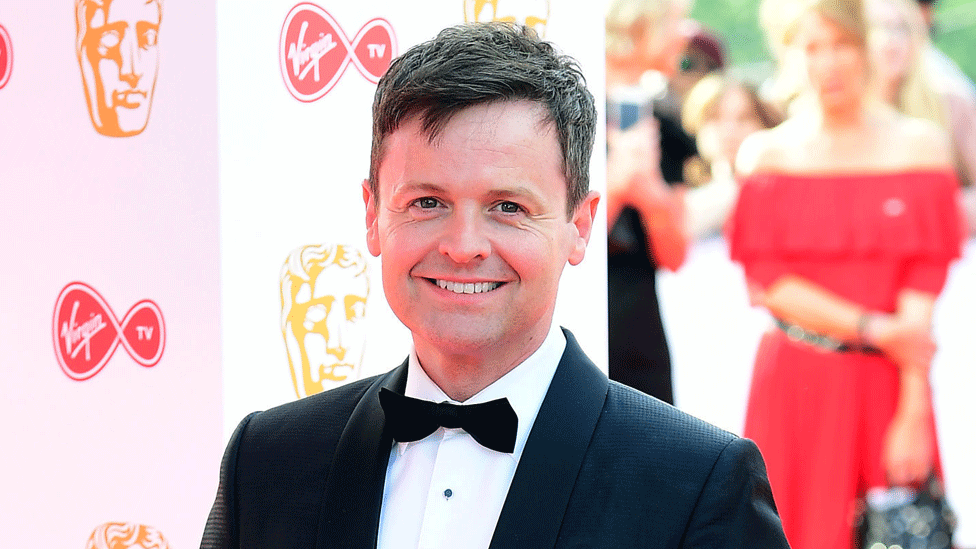Britain's Got Talent: Is Lost Voice Guy's win a watershed moment for disability?
- Published
Britain's Got Talent final
On Sunday evening, Britain's Got Talent drew to a close and this year's winner was crowned. Nothing unusual there.
But Lost Voice Guy's victory wasn't just notable because he was the first comedian to win in the show's history - but also because he has cerebral palsy.
Furthermore, the runner-up, another comedian named Robert White, has Asperger syndrome.
The pair helped the show attract its biggest audience since 2015 - an average of 8.7 million viewers tuned into the final, according to overnight figures.
Both acts made light of their own disability in their acts. So is this a watershed moment for disability on TV?
"No," says broadcaster Mik Scarlet, who is now an inclusion and equality trainer. "I think it's just another one of those moments that happens throughout the history of media.
"The media has always believed that the public can't cope with disability, but that's just never been my experience.

Allow YouTube content?
This article contains content provided by Google YouTube. We ask for your permission before anything is loaded, as they may be using cookies and other technologies. You may want to read Google’s cookie policy, external and privacy policy, external before accepting. To view this content choose ‘accept and continue’.

"I was discovered in a similar, not quite so dramatic, hail of praise and glory in 1989, and I went on to become one of the most famous disabled presenters."
Mik, who uses a wheelchair, became a familiar face to viewers as the presenter of Channel 4 kids TV show Beat That, and went on to acting roles in The Bill and Brookside.
"Everywhere I went, all the people I met were fine with [my disability], they genuinely didn't care," he says.
"What this actually needs to be is a watershed moment where the media wakes up to the fact that, actually, the general public are absolutely fine with disability."
He adds: "Hopefully what might happen is now the media will stop making it such a terrible tragedy story.
"It's very easy for them to shine a light on the public and go 'Oh look the public voted, they must have changed,' when actually this is the first time the public have been given the chance to vote."
Viewers may not have had many opportunities to vote for acts like Robert White and Lost Voice Guy - whose real name is Lee Ridley - in talent shows before, but disabled people have been represented on screen in a variety of other ways in recent years.
Noughties comedy series Little Britain (which starred David Walliams - now a Britain's Got Talent judge), saw Matt Lucas play a disabled character who was secretly able-bodied.

David Walliams and Matt Lucas in Little Britain
The sketches poked fun at the idea that disabled people fake their condition in order to claim benefits, and the show was hugely popular with viewers.
But now the comedy is coming from disabled performers themselves.
Dean Chaffer, a comedy fan who also has cerebral palsy, has been following Lost Voice Guy's career for a number of years.
"Watching Lee around various comedy clubs and places around the north-east over the years, how he supported Ross Noble in the early days of his career, that was really good," he recalls.
"And hopefully he can go as far as he wants to doing comedy, and challenging people's perceptions of disability and getting laughs along the way."
He adds: "The first rule of comedy is just to be funny and I think that's what Lee does really well.
"Disabled people have a sense of humour, just like everyone else... we're just like normal people, and I think it needs to be highlighted that Lee and Robert were up there because they were the funniest people."
Tim Renkow, another comedian with cerebral palsy, told BBC News: "[The audience] can get super uncomfortable when you get on stage but once you've done three jokes, they just don't care and they want you to be funny."

Lost Voice Guy beat 10 other finalists to win BGT, with 21% of the public vote
One of the factors key to both White and Ridley's success, Mik thinks, is the fact that they actively made their disability the subject of some of their comedy.
"There are a few people now who work in the media who are disabled but never really mention it. The thing about Lost Voice Guy is he goes on about it, it's his set," he says.
"And I think it'd be really nice if disabled people could finally be allowed to talk about it again, and be considered something other than a contributor. At the moment, if you want to talk about disability on television you tend to be a contributor, and not anything else.
"And I think that might be a really important change; that we see comedy where disability is in it and it's done well.
"Hopefully soon you'll have a really funny comedy about disability, which makes disabled people laugh, but also makes non-disabled people laugh not at us, but with us."
Mik adds that he hopes Lost Voice Guy's win will open doors for a new generation of disabled performers.
"Recently there's been a very unhealthy attitude that the only way for a disabled person to follow a dream is to become a Paralympian.
"And I hope that what this does is say to the next generation of kids, 'Do anything, do what you like, do what you're good at'."
Another comedian Francesca Martinez, who also has cerebral palsy, has often made light of her disability in her comedy routines - including during an appearance on the BBC's Live At The Apollo.
Channel 4 comedy show The Last Leg is now in its 13th series, despite it initially only being commissioned for a brief run during the London Paralympics in 2012.

The Last Leg: Josh Widdicombe, Adam Hills and Alex Brooker
The show, which stars Josh Widdicombe, Adam Hills and Alex Brooker sees Hills and Brooker regularly make fun of their own disabilities - Hill was born without a right foot and Brooker's right leg was amputated when he was a baby. He also has hand and arm deformities.
"I think we need disability to be normalised on screen," says Dean.
"The BBC has had Silent Witness (which earlier this year featured an episode with three disabled actors) and we just need to see disabled people going about their everyday lives."
"There will be things that a disabled person finds funny and it's often about things that have happened to you. Sometimes as a disabled person you go through things, and you think, if I don't laugh about it, what would I do?
"And I think that's the reason shows like The Last Leg are there, because it enables everyone to have a conversation about disability, and it's no longer taboo.
He continues: "Now that we have platforms like YouTube, disabled people are able to present themselves in the way that they want to and say this is my life that I'm living, rather than somebody who's controlling or producing the show, looking at having a version of them on screen.
"Disabled people now have much more control in representing themselves and challenging people."
- Published4 June 2018

- Published28 May 2018

- Published31 May 2018
